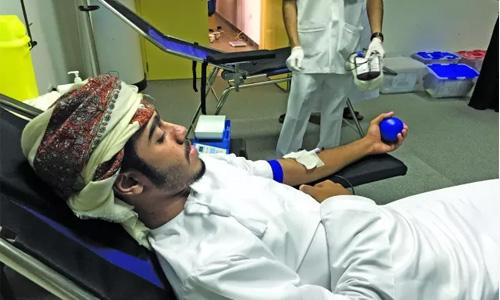Blood shortage hits surgeries at Sultan Qaboos University Hospital
One of Oman’s biggest hospitals is facing blood shortage, which has resulted in the postponement of appointments and surgeries. The situation has also forced authorities to urge the public to come forward and visit the blood bank to donate blood.
“The Sultan Qaboos University Hospital (SQUH) is facing a shortage of 4,000 blood units (bags) per year. But this week the shortage became acute due to a number of car accidents on Monday,” an official said.
The hospital needs 12,000 units every year, but only 8,000 donors have donated so far.
“So far, the hospital has been able to manage the situation by calling in blood donors, and requesting additional supplies from other blood banks. This situation has been communicated to the doctors and surgeons in the hospital, and the priority for treatment is being decided accordingly,” Dr. Arwa Al Riyami, senior consultant hematopathologist and chairperson of the Blood Donation Committee at SQUH, said.
First time donor? Here's what do you need to know before donating blood
Group O donors
“Group O donors are particularly preferred in emergency situations,” the doctor added.
Ali Al Marhoobi, chief biochemical scientist at SQUH, said that such shortages would affect patients needing regular blood transfusions as they will be receiving less bags of blood resulting in rescheduling of their next appointments, creating chaos in the appointment system.
Although Oman suffers from lack of donors throughout the year, Al Riyami said the summer and holiday seasons are the driest ones as many people travel outside the country.
“During the month of Ramadan, the shortage increases as the people who fast, avoid donating blood,” said Al Riyami, adding that the SQUH blood bank expands
its working hours to 24 hours during Ramadan.
She also pointed out that the SQUH blood bank meets its own demand primarily with its own in-house collections and by holding blood donation campaigns.
A proportion of the blood is also supplied from the central blood bank in Bausher.
Al Riyami said there is cooperation among all blood banks in Oman to meet the shortage, but the demand for blood is increasing, with the expansion of hospital services. “We need to increase voluntarily donations to serve the society,” Al Riyami noted.
Meanwhile, SQUH’s Blood Donation Committee organised a blood donation drive at the Sultan Qaboos University Student Services on Wednesday from 10am to 4pm.
Fakhria Al Amri, dupty chairperson of the blood donation committee stated that many people showed up after the social media campaign.
Any citizen or expatriate can donate blood if they fulfil the donation criteria.
The donor must be in good general health, has to eat a supper before giving blood and bring along an ID card or labour card for expats while attending the blood bank.
“Volunteers will need to fill one form and give information about their age (must be above 18 years of age) and weight (above 50 kg),” officials said.
“The Sultanate follows international regulations to determine eligibility for blood donation and final determination is made by the medical team at the blood drive or blood donation centre,” Al Riyami added.
“We need to drive more people to join our campaigns,” Al Marhoobi stressed while pointing out that each individual can donate up to four times a year.
“The SQUH blood bank is open from 7:30 am to 9:00 pm from Saturday to Thursday for receiving any donations,” the SQUH said.
Photo Captin: The hospital needs 12,000 units of blood every year, but donations so far have been only 8,000 units. – A R Rajkumar
Related Posts

